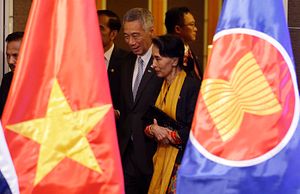Earlier this month, Singapore and Myanmar carried out what was officially declared as the first passing exercise between their two navies. While the development was just one of many within the Singapore-Myanmar bilateral relationship, it nonetheless highlighted some of the ongoing activity on the defense aspect of ties between the two Southeast Asian states.
Singapore and Myanmar have had an official diplomatic relationship dating back to 1966 that also includes a defense dimension. While the headlines can often focus on episodic developments, such as the arrests of militant sympathizers in Singapore, both sides also have areas of collaboration that include visits and exchanges.
Earlier this month, the defense links between the two countries were in the headlines again with the holding of the first passing exercise between the two navies of its kind. Per the Republic of Singapore Navy (RSN), two RSN vessels conducted a passing exercise (PASSEX) as the vessels sailed up the Yangon River after a call at Port Blair in India’s Andaman and Nicobar Islands territory, where they had a pre-arranged exercise, professional exchanges, and shore activities with the Indian Navy.
According to RSN in a statement through its official social media channel on July 10, the PASSEX featured two of the RSN’s Victory-class corvettes, the RSS Valiant and the RSS Valor, and a Kyan Sit Thar-class frigate from the Myanmar Navy. Apart from the PASSEX, both sides also had discussions and exchanges, with Singapore commanders calling on Myanmar officials including Htein Win, who is the head of the Ayeyarwady Naval Command.
While the specifics provided on the engagement itself suggests that it is quite basic, the exercise nonetheless constitutes a notable first for Singapore-Myanmar defense ties. And while the interactions Singapore had with India and Myanmar were messaged separately, the interconnection between them nonetheless speaks to Singapore’s own ongoing efforts to further develop networks of collaboration in the wider Asia-Pacific region as a longtime U.S. partner and an active security contributor in its own right amid ongoing conversations about the broader Indo-Pacific.
Reflecting on the significance of the exercise, the RSN said the exchanges were important for “building strong defense relations and practical interoperability with our regional partners.” And though few additional specifics were disclosed about the nature of the exercise, such interactions will continue to be important to pay attention to as both sides continue to develop their bilateral relations, including in the defense realm.

































